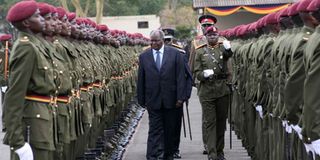The Second Coming of ‘apostle’ Kibaki

Former President Mwai Kibaki inspecting a guard of honour during a GSU pass-out parade in Embakasi on September 12, 2012.
There it was. On Saturday, the Nation had the headline “The Kibaki factor in 2022 elections”, in which the paper reported that top presidential candidates are seeking to be associated with former Kenya president Mwai Kibaki’s achievements.
It’s not just politicians looking to have this newly rediscovered Kibaki stardust sprinkled on their shirts. On Kenyan Twitter and social commentary, Kibaki is enjoying a wonderful run. The way it is being told, all Kenya’s problems would have been sorted if he was still in charge. Dinner tables would be overflowing if Kibaki were still president. The locusts might not have invaded if he was chief. The Kibaki decade, 2003-2013 is now the most glorious in Kenya’s history.
Unless one has a short memory, this Kibaki worship has to be one of the most remarkable things in Kenyan politics, because while he was president, he was not universally loved. And after the election fiasco of December 2007, and the violence that followed, Kibaki vilification became a cottage industry.
Did wonderful things
That vilification was undeserved because the Kibaki administrations did some wonderful things, and pulled Kenyan from the edge of despair to which Daniel arap Moi’s Kanu government had taken it. What it told us, though, is that Kenyans won’t admire and hold you high while you are in power. They will only love you once you leave, though not unconditionally. Thus while sentiment towards Moi improved, even at his death, contempt for him across a large swath of Kenya remains.
To buy Kenyans’ post-presidential affection, you have to purchase it while you’re in power. Knowing which currency they will accept is the main problem.
This is little comfort for President Kenyatta, who has been tongue-lashed and beat down in ways no other Kenyan president has because he can’t be sure if the currency he is expending will pay off.
On the other hand, he can take some relief from the knowledge that he wouldn’t have been loved while in power, anyway.
So what is it about Kibaki that other Kenyan and African leaders who want to get adulation after office can learn?
Rebuilding of Kenya
Immediately, it gets complicated. To begin with, Kibaki did not visibly seek to shape a legacy. He didn’t have anything like Uhuru’s “Big 4 Agenda”, but still oversaw easily the most dramatic rebuilding of Kenya. It took months, for example, before it became clear to most that Thika Road was being expanded into a dual carriageway. There were no drumbeats over it until it was close to being done.
Then, Kibaki was good at riding a wave or creating it. The optimism that swept Kenya after Moi’s departure, and the reopening of the country was always going to result in a creative boom that produced the “Silicon Savannah” mantra. Somehow, Kibaki was able to come across as its patron.
In 2011 Kenya became one of the first countries in the world to launch an open data initiative. At that time, it was still considered a national security risk by securocrats. When we assembled at the Kenyatta International Conference Centre (KICC) for the launch, there was uncertainty if it would take place, particularly when Kibaki’s arrival was delayed. Word had it that the security folks had killed it.
Digital grandpa
However, the story later went that when Kibaki woke up, he had his breakfast, wore his suit, and said, “There’s this thing I am supposed to open at KICC, let’s go”. And that was it. At the event itself, Kibaki spoke about Facebook, and the room went wild. He was also rumoured to have broken ranks that made the early mapping of Nairobi on Google Maps possible. Kibaki became the digital grandpa. You have to find the wave to ride.
The post-election violence of 2007 was a huge dent on Kibaki’s reputation, yet he recovered from it. How? Here’s another big lesson. If you steal an election, make it look like others stole it for you. It’s like corruption, which also dogged his administration. Don’t leave your fingerprint on an incriminating piece of paper. And if someone close to you is caught with their hand in the cookie jar, drop them like a hot potato. In the fullness of time, you will be judged favourably.
It’s also important that you look vulnerable. Kibaki was often cast as bumbling, and prone to the occasional embarrassing public spectacle, like when his trousers fell to his knees when he was speaking on a podium. He was also portrayed as henpecked, tormented by First Lady Lucy Kibaki. In the end, he came across as a sympathetic and non-threatening figure. That clearly is a great recipe for legacy.
But perhaps his best trick is the one that has proved most difficult for former presidents to pull off — don’t lose sleep over your legacy. Leave and stay out of sight. Don’t publicly patronise the nation with your wisdom. And even all this, only half the story. Maybe, only Emilio Stanley Mwai Kibaki can be Kibaki.
Mr Onyango-Obbo is a journalist, writer and curator of the “Wall of Great Africans”. @cobbo3





